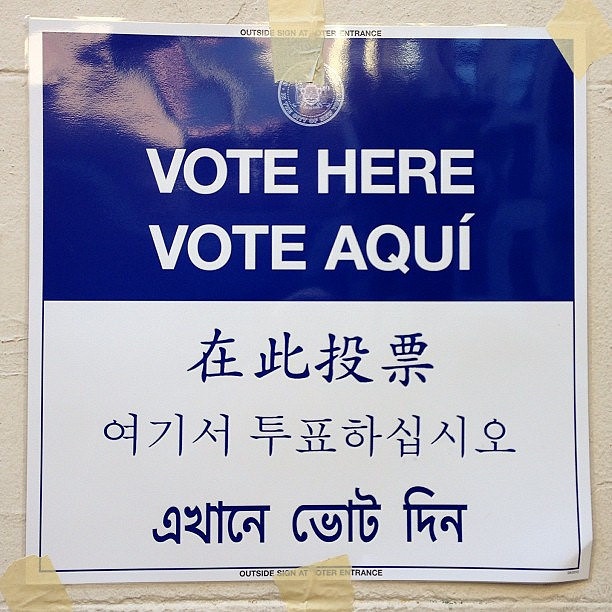As anti-immigrant rhetoric rises, Asian Americans turn to the Democratic Party

Asian-American voters are increasingly identifying as Democrats, according to a national survey released this week. (Photo by Scott Beale via Flickr.)
Asian-American voters, who represent the fastest-growing part of the Southern electorate, have been unique in their lack of allegiance to either political party. Although they have been increasingly supportive of Democratic candidates, nearly half of Asian-American voters in 2012 did not identify with either political party.
But a new national survey finds that this year Asian Americans are identifying as Democrats at record rates.
According to a multilingual survey of 1,200 Asian-American voters released this week by Asian Americans Advancing Justice, Asian and Pacific Islander American Vote and AAPI Data, the share of Asian-American voters who identify as Democrats increased from 35 percent in 2012 to 47 percent this year. Asian-American voters had a net favorable view of the Democratic Party, with 64 percent viewing it favorably and 19 percent viewing it unfavorably.
Survey authors point to respondents' negative reaction to anti-immigrant rhetoric expressed by many Republican candidates as a potential factor contributing to this leftward shift. When respondents were asked if they would vote for a candidate with whom they agreed with on most issues but who expressed strongly anti-immigrant views, 40 percent responded they would vote for someone else.
“We can't prove conclusively why the shift has occurred,” said Karthik Ramakrishnan, director of AAPI Data and a professor of public policy at the University of California at Riverside.
“But it stands to reason that given all the anti-immigrant and exclusionary rhetoric more generally coming from the Republican Party, that it might be crystallizing opinion among Asian-American voters who tended to lean Democrat.”
In the South, Asian Americans are a fast-growing segment of the electorate who may be more independent than national trends suggest. State-level data from the survey shows that 40 percent of surveyed Asian-American voters in Virginia identify as Democrat, compared to 47 percent nationally. In North Carolina, just over half of registered Asian-American voters this year are unaffiliated, according to Facing South's analysis of state voter data.
Asian Americans have been under-engaged as voters, with turnout rates lower than that of the overall electorate. But their growing numbers in states like Georgia, North Carolina and Virginia could make them a key demographic for candidates to engage to win those states' increasingly close contests in federal and state races.
Tags
Allie Yee
Allie is a research fellow at the Institute for Southern Studies and is currently studying at the Yale School of Management. Her research focuses on demographic change, immigration, voting and civic engagement.
